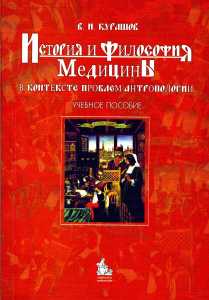© 2012 B.V. Markov
2012 – № 1 (3)
Key words: history of medicine, philosophy of medicine, physical health, spiritual health, science, science methodology, philosophy of science, sense of life, ecology, soul, consciousness, interdisciplinary approach
Abstract: The present essay is a review of the manual “History and Philosophy of Medicine in the Context of Anthropological Issues” by V.I.Kurashov, Doctor of Philosophy, Professor, Head of the Department of Philosophy of Kazan State Technologic University (KGTU). The review underlines strong and weak points of the manual, analyses its contents, presents general thoughts of the author on the subject of current Russian medicine and population health.
 The reviewer starts the essay by talking about general state of Russian medicine. One of the thoughts that he ponders in relation to the reviewed book is that the profession of a doctor could not be limited to knowledge of particular units of medical and biological sciences, or clinical medicine. Without knowing and understanding principles of science logic and methodology, as well as biomedical ethics and deontology, a doctor will be just a “medical worker”, not a curing doctor.
The reviewer starts the essay by talking about general state of Russian medicine. One of the thoughts that he ponders in relation to the reviewed book is that the profession of a doctor could not be limited to knowledge of particular units of medical and biological sciences, or clinical medicine. Without knowing and understanding principles of science logic and methodology, as well as biomedical ethics and deontology, a doctor will be just a “medical worker”, not a curing doctor.
The reviewer elaborates on the contents of the book. The manual starts with the unit “Science and science methodology” which contains important information on the cognitive tools of a scientist. Next unit dwells on existential goals of medicine which makes it closer to philosophy. It is quite widespread that many people, especially doctors, become philosophers with age. V.I.Kurashov brings together medical advice and philosophic recommendations in such units as “Meaning of life of humans and humanity”, “What kind of truths does a human need to understand?”, “Life of a human and life of humanity: metaphysical horizons and everyday life”, “Philosophy of individual health”, “Typology of individual crises”, “Ecology and eschatology”, “Human ecology in the context of the concept ‘anthropological proportion’”, “Health, diseases and longevity from natural-science, philosophical, and religious viewpoints”, “Nutrition from medical-biologic and historical-culturological viewpoints”, “Age: philosophic, religious and medical issues”, “Medicine and gender issues”.
The unit “Life, diseases, death: biomedical ethics and medical deontology” deserves special attention. It has such important sub-units as:
-Attitudes to life, health and death at different times in different cultures;
-Life and conscious death of a human from philosophic, religious and natural-science perspectives: heroic sacrifice, suicide, euthanasia.
-Human cloning: issues of “spare parts” and life extension in new human clones?
-Transplantation issues: from medical-biologic, philosophic and religious viewpoints.
-Abortion as a complex problem of biomedical ethics, philosophic and religious teachings.
-Do sick people have a moral right to torture people around them?
-Medical ethics, deontology and “Its Majesty” money.
-Clinic as an institution: social, scientific and ethical issues.
-Clinical medicine and medical bureaucracy.
After that the author gives deep analysis of methodology of science in the unit “Methodological principles of medical-biologic sciences and clinical medicine”. It has the following sub-units:
-Development of medical-biologic knowledge in interdisciplinary scientific areas.
-Peculiarities of medical knowledge cognition.
-General scientific methodological principles and examples of their functioning in medicine.
-Classification of objects of scientific-philosophic knowledge and typology of objects of medicine.
Special scrutiny is given to principles and issues of diagnostics, logic and semiotics of diagnosis. Finally, the author analyses “three caryatides of medicine”: pharmacology, therapy and surgery.
The reviewer also talks about weak points of the manual. For instance, Kurashov tends to understand ‘soul’ as a complex of the conscious and the unconscious. The reviewer, however, makes a distinction between ‘soul’ and ‘consciousness’ stating that these concepts are not compatible, as they belong to different areas: philosophic, religious, scientific-psychological, psychoanalytic, etc.
All in all, the reviewer supports V.I.Kurashov’s intention to unite philosophy and science. Kurashov’s books are distinct because of their interdisciplinary character, or, in other words, considering problems in the context of major scientific disciplines and historic perspective from classical antiquity to present days. The reviewer states that Kurashov’s book could be justifiably recommended as a manual for medical schools and post-graduate medical education.